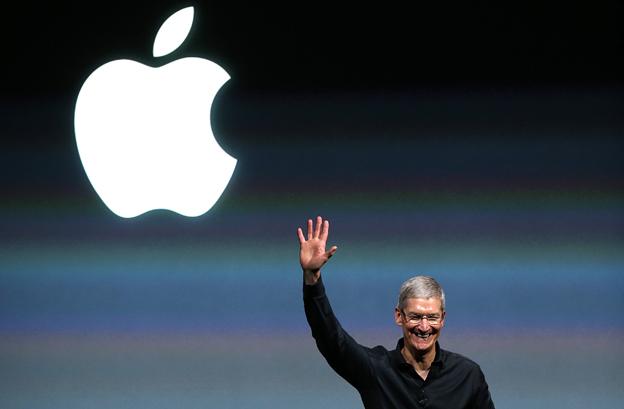Apple - follow the mobile money
- Published
- comments

On Tuesday in Cupertino, Apple's Tim Cook may finally step out of the shadow left by Steve Jobs. In what is being billed as the company's most important announcement for years, the understated chief executive will unveil the iPhone 6, and the "new category" that he has been promising all year, some kind of wearable connected device.
This will be touted by Cook and his team as evidence that the sceptics who said Apple could no longer innovate after Jobs were absurdly misguided
But the most significant new product may not be the iWatch - or whatever the chief designer Jony Ive has decided to call it. Instead, we should all be following the money. There has been plenty of talk in recent days of secret negotiations between Apple and the likes of American Express, Visa and Mastercard over a new mobile payments system.
As Apple already has something like 800 million iTunes accounts with linked credit cards, it is very well placed to be a major player in the future of payments. So perhaps we will see news that users of the new iPhone will be able to swipe to pay for goods in stores with their devices. That would involve the new phones at last getting NFC - Near Field Communications - capabilities built in.
This has been rumoured with every new iPhone in recent years, then failed to materialise, much to the disappointment of the technology's supporters. But this time it seems a near certainty. Of course, there are already plenty of ways of paying with your mobile phone, and just about every smartphone now has NFC, but so far consumers have shown only mild interest in the idea of a mobile wallet.
But some experts on digital money think Apple could go much further than just a mobile wallet, with a plan to bring added security to online shopping. Ever since chip and pin was introduced, credit card fraud has been contained on the high street, but soared on the internet.
There are lots of initiatives to upgrade online security - just last week Barclays showed off its new fingerprint sensor which examines the unique pattern of your veins to verify your identity. But most of these systems make online payments so cumbersome that they put many people off the whole idea.
If, however, a mobile phone could identify its owner and therefore provide the shopper, the bank, and the retailers with a guarantee of a secure transaction, then that could be a game-changer. There is mounting speculation that the new iPhone - and possibly the new wearable device - will have some kind of embedded security chip that does just that.
"If Apple can effectively take chip and pin online, that's huge," one payments expert told me. And if that is the case, then Tim Cook and his team will no doubt have negotiated a healthy slice of the margin on every transaction.
This is all speculation of course, and Cook may decide that an audience packed with fashionistas does not want to hear about embedded security systems. What's more, with the dust still settling after the hacking of celebrities' photos from their iCloud accounts there are bound to be questions about entrusting Apple with the security of the payments system.
But amidst all the glitz and glamour of Tuesday's meticulously choreographed event at Cupertino's Flint Centre for the performing arts, listen out for some slightly dull stuff about payments. Nobody knows what the wearable technology market will be worth in the coming years - but it is a fair bet that making Apple the gatekeeper for secure online shopping will prove quite a lucrative business.